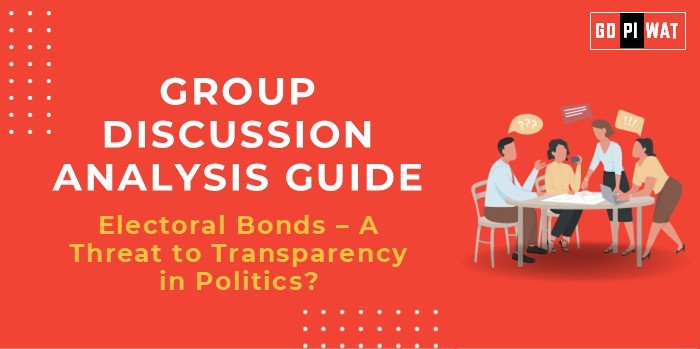📋 Group Discussion (GD) Analysis Guide: Electoral Bonds – A Threat to Transparency in Politics?
🌐 Introduction to the Topic
Electoral bonds, introduced in India in 2018, aim to enhance transparency in political funding by offering a system for donors to contribute anonymously. However, critics argue that the anonymity undermines the fundamental principles of democratic accountability. With elections shaping governance, the debate over electoral bonds’ implications for transparency and fairness has grown more significant.
📊 Quick Facts and Key Statistics
- 📅 Launch Year: 2018, introduced by the Government of India.
- 📈 Contribution Ceiling: No upper limit on political donations through electoral bonds.
- 💰 Usage Volume: ₹10,000 crore+ worth of electoral bonds encashed since launch (2023 data).
- 📉 Transparency Rating: India ranked 93rd in the 2023 Corruption Perceptions Index, with political financing flagged as a concern.
- 🌍 Global Parallel: Countries like Germany mandate disclosure for political contributions above a certain threshold.
🤝 Stakeholders and Their Roles
- 🏛️ Government: Facilitates the scheme while defending anonymity as protecting donor privacy.
- 🎯 Political Parties: Major beneficiaries, with ruling parties reportedly gaining a higher share of donations.
- 🤫 Donors: Corporations and individuals seeking to fund political campaigns with confidentiality.
- 📢 Civil Society: Advocates for transparency, highlighting the risks of quid-pro-quo corruption.
- ⚖️ Election Commission and Judiciary: Critical players in reviewing the constitutional validity and implementation.
🏆 Achievements and Challenges
✨ Achievements:
- ✅ Ease of Contribution: Simplifies political funding by providing a structured, formal channel.
- 🧾 White Money: Bonds purchased through cheques and digital modes reduce black money usage.
- 📊 Boost to Donations: Record-high funding in recent elections shows greater donor engagement.
⚠️ Challenges:
- 🔍 Transparency Gap: Anonymity blocks public knowledge of donors’ identities.
- 🏢 Corporate Influence: Allows corporates to disproportionately influence political agendas.
- 🤔 Public Distrust: Perception of favoritism undermines faith in the democratic process.
🌏 Global Comparisons:
- 🇺🇸 USA: Enforces donor disclosures for significant contributions.
- 🇩🇪 Germany: Prohibits anonymous political donations above €10,000.
📄 A report by ADR (Association for Democratic Reforms) highlighted that 75% of electoral bond contributions benefited the ruling party, raising questions about impartiality.
💡 Structured Arguments for Discussion
- 📢 Supporting Stance: “Electoral bonds reduce cash-based corruption in political funding by formalizing the process.”
- ❌ Opposing Stance: “Anonymity in electoral bonds promotes opacity and potential quid-pro-quo arrangements.”
- ⚖️ Balanced Perspective: “While electoral bonds curtail cash corruption, enhanced transparency measures are essential to ensure accountability.”
📌 Effective Discussion Approaches
🎯 Opening Approaches:
- 📊 Start with statistics: “Over ₹10,000 crore worth of electoral bonds were encashed, yet donor details remain undisclosed.”
- ⚡ Highlight a contrast: “Electoral bonds aim for transparency, but their anonymity clause contradicts democratic accountability.”
- 🌍 Leverage global examples: “Unlike Germany or the US, India’s political donations lack mandatory disclosure norms.”
🔄 Counter-Argument Handling:
- 🌏 Use international examples to refute claims of necessity for donor anonymity.
- 🛡️ Highlight the need for safeguards to prevent misuse without compromising privacy.
📚 Strategic Analysis of Strengths and Weaknesses
- 💪 Strengths:
- ✅ Legal compliance mechanism.
- 💵 Reduces cash-based corruption.
- ❌ Weaknesses:
- ❌ Lacks transparency.
- ⚠️ Potential misuse for corporate lobbying.
- ✨ Opportunities:
- 🔍 Introduce transparency clauses to restore public trust.
- 🖥️ Leverage technology for anonymized but auditable disclosures.
- ⚠️ Threats:
- ⚠️ Political mistrust undermining democracy.
- 📉 Comparisons with stricter global standards.
🎓 Connecting with B-School Applications
🌐 Real-World Applications:
- 🧩 Themes on ethics in finance and governance.
- 📖 Campaign financing models in policy courses.
❓ Sample Interview Questions:
- ❓ “Do electoral bonds enhance or inhibit transparency in democratic processes?”
- 💡 “Propose an alternative political funding model balancing transparency and donor privacy.”
📈 Insights for B-School Students:
- 🤔 Critical thinking on ethical dilemmas in governance.
- 🌍 Opportunities to explore cross-country comparisons of campaign financing.


